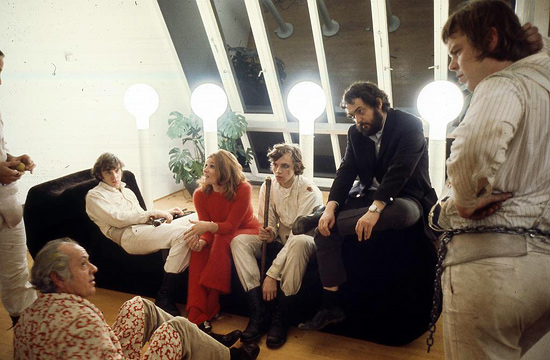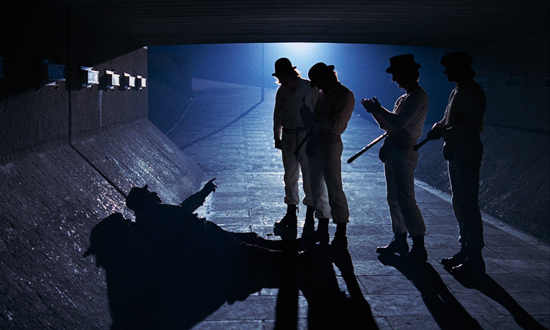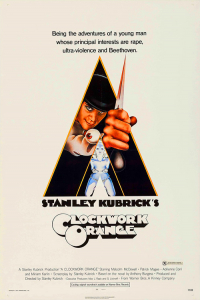“Quite simply, A Clockwork Orange is significant because it’s a Stanley Kubrick film.” – Raymond Benson, Cinema Retro
The Digital Bits and History, Legacy & Showmanship are pleased to present this retrospective commemorating the golden anniversary of the release of A Clockwork Orange, Stanley Kubrick’s (Dr. Strangelove, 2001: A Space Odyssey) critically acclaimed film based upon Anthony Burgess’s novel and starring Malcolm McDowell (Time After Time, O Lucky Man!) as gang leader Alex whose principal interests of rape, ultra-violence and Beethoven occupy his life before the government attempts a rehabilitation.
The film was nominated for four Academy Awards (including Best Picture), and in 2020 the Library of Congress selected A Clockwork Orange for preservation in the National Film Registry as being “culturally, historically or aesthetically significant.” Its most recent home media release, on 4K UHD, was in 2021 (and is reviewed here). [Read on here...]
For the occasion of A Clockwork Orange’s recent anniversary, The Bits features a multi-page article consisting of a Q&A with a quartet of film historians who reflect on the film, plus box-office data and statistics, passages from film reviews, and a reference listing of its first-run theatrical presentations in the key markets of North America.

CLOCKWORK NUMBER$
- 0 = Number of Academy Awards
- 4 = Number of Academy Award nominations
- 4 = Number of cinemas playing the film during its opening weekend
- 4 = Rank among top-earning films directed by Kubrick (adjusted for inflation)
- 6 = Rank among top-earning films released in 1971 (lifetime/retroactive)
- 7 = Rank among top-earning films during the 1972 calendar year
- 11 = Rank among Warner Bros.’ all-time top-earning films at close of first run
- 41 = Number of weeks the longest-running engagement played (domestic)
- 61 = Number of weeks the longest-running engagement played (international)
- 89 = Peak all-time box-office chart position
- $1.3 million = Production cost
- $9.0 million = Production cost (adjusted for inflation)
- $12.0 million = Domestic box-office rental (earnings through 12/31/1972)
- $13.5 million = Domestic box-office rental (earnings through 12/31/1973)
- $14.0 million = Domestic box-office rental (earnings through 12/31/1974)
- $14.5 million = Domestic box-office rental (earnings through 12/31/1975)
- $15.0 million = Domestic box-office rental (earnings through 12/31/1976)
- $17.0 million = Domestic box-office rental (earnings through 12/31/1992)
- $41.0 million = Domestic box-office gross (estimated; unconfirmed)
- $73.0 million = International box-office gross (estimated; unconfirmed)
- $114.0 million = Worldwide box-office gross (estimated; unconfirmed)
- $808.1 million = Worldwide box-office gross (estimated; adjusted for inflation)

PASSAGES FROM A SAMPLING OF FILM REVIEWS
“Literal-minded in its sex and brutality, Teutonic in its humor, Stanley Kubrick’s A Clockwork Orange might be the work of a strict and exacting German professor who set out to make a porno-violent sci-fi comedy. Is there anything sadder—and ultimately more repellent—than a clean-minded pornographer? The numerous rapes and beatings have no ferocity and no sensuality; they’re frigidly, pedantically calculated, and because there is no motivating emotion, the viewer may experience them as an indignity and wish to leave. The movie follows the Anthony Burgess novel so closely that the book might have served as the script, yet that thick-skulled German professor may be Dr. Strangelove himself, because the meanings are turned around.” – Pauline Kael, The New Yorker
“With the appearance of Stanley Kubrick’s A Clockwork Orange, he takes a step upward to the hallowed directorial ranks of Bergman and Fellini.” – Barry Morrison, The Denver Post
“One is left with the decidedly creepy impression that this is the sort of movie that Charles Manson might love to make.” – Gary Arnold, The Washington Post
“Malcolm McDowell as the patient-victim-hero on the screen is dragged through hell to cure him of his penchant for criminal violence, but it isn’t explained why the audience is being punished. Seeing Kubrick’s movie had the same painful effect on me that being forced to look at repellent, violent films has on the young thug narrator. Yet I was aware that people around me were grooving on A Clockwork Orange as the ultimate trip into mod decadence. This is surely one bit of fiendish irony that didn’t occur to Burgess as he wrote his satire about crime and punishment in the future. Burgess may not have realized it, but his book has provided Kubrick with the ideal vehicle to combine the freakout technology of 2001 and the hip-nihilistic philosophy of Dr. Strangelove. Kubrick doesn’t merely depict decadence; he provides the excuse for enjoying it by presenting a world so far out of control that only fools and squares cling to outmoded notions of decency and progress…. If this movie is a hit, it won’t be because people are horrified by this prophecy of dehumanization. It will be because the young audience accepts this nightmare vision as a turn-on. Kubrick’s idea of the future is the orgiastic present, only more so.” – Martin Knelman, The Globe and Mail (Toronto)
“The kind of tour de force that marks Kubrick as a true genius of the cinema.” – Paul D. Zimmerman, Newsweek
“I’m afraid I found A Clockwork Orange brilliant but disappointing, its moments of power offset by an overwrought stridency and its message overbalanced by the medium. It is a remote work, icy and abstract, strangely shy of the echoes of real human voices. It is also genuinely thought-provoking and uncompromising.” – Charles Champlin, Los Angeles Times
“Malcolm McDowell is sensational. His performance has the range and dynamism that signal the arrival of a new superstar. As for director Kubrick, his work is stylistically almost flawless. If there was any doubt after 2001, A Clockwork Orange confirms Kubrick as our most audacious film maker.” – Jay Cocks, Time
“Malcolm McDowell plays Alex in the style of a latter-day Leo Gorcey, with perfect smarmy presence. The others in the cast are generally acceptable, although Patrick Magee’s looniness, as a revolutionary polemicist crippled by the hoods and whose wife dies after being raped by them, is as graphic as a cartoon. So, for that matter, is Clockwork Orange, which is already the most overrated work of the year (Best Film, Best Director, from the New York Film Critics). It is, I’m afraid, nothing more than a garish Pop-art poster pretending to be a work of art.” – Kevin Kelly, The Boston Globe
“A Clockwork Orange is so beautiful to look at and to hear that it dazzles the senses and the mind, even as it turns the old real red vino to ice. A tour de force of extraordinary images, music, words and feelings. Malcolm McDowell is splendid as tomorrow’s child, but it is always Mr. Kubrick’s picture, which is even technically more interesting than 2001.” – Vincent Canby, The New York Times
“Clockwork Orange is a bit of brilliantly executed future shock from Mr. Stanley Kubrick, and oh, my brothers, it is not fare for the faint or weak at heart. Malcolm MacDowell [sic] gives a brilliant performance as Alex, a brutal but engaging London hood of the not-too-distant future. This is easily the most controversial film of the year. What Alex, in his Orwellian dialect, refers to as ‘the old ultraviolence’ has sparked a flood of outraged editorializing from people who, one suspects, missed the point of it all.” – Howell Raines, The Atlanta Constitution
“Harrowingly humanistic, magnificently moral and chillingly Christian. It’s not merely in the challenging content but also in the daringly original treatment that the film never loses its balance on its tight-rope walk to brilliance.” – John E. Fitzgerald, The Catholic News
“This movie begins where all others leave off and its ‘X’ rating proves, once and for all, the ineptitude and meaninglessness of movie ratings.” – Rex Reed, New York Sunday News
“It is told in some heavy British dialect that seems to echo in a cave; in addition it dwells heavily on the teen-age slang supposed to be current in the future. All of this makes it often unintelligible to the ears. Fortunately, it speaks eloquently to the eyes.” – Emerson Batdorff, The Plain Dealer (Cleveland)
“It is doubtful that any novel has ever been adapted for the screen as brilliantly as this one. It will undoubtedly cause shock waves among other directors, for Kubrick, in technical areas, at least, has surpassed them all. It can be said, without question, that he is this country’s most important filmmaker, fit to stand on a pedestal beside Europe’s best, Bergman and Fellini.” – Hollis Alpert, Saturday Review
“It is not one of the best movies of the year, it is not a classical work of art, it is not the best picture of the decade, it is not a breakthrough in the infant history of film as an art form. And, perhaps more important than all of the foregoing, A Clockwork Orange is not Stanley Kubrick—America’s best filmmaker—at his best. Yet, A Clockwork Orange is considerably more of a movie than most which have been made in the past year. Not in the top two or three, certainly—but better than most. And, if [t]he work is not Kubrick at his best, one supposes that some future film scholar (Rex Reed III, God forbid?) will describe the film as a Kubrick sidetrip, an amusing if imperfect excursion off the beaten path that eventually reaches a dead end. I am saying, then, that even a mediocre Kubrick movie is better than the best effort by many of his alleged peers and that this is why we have heard and read such an unprecedented barrage of talk, argument, praise, criticism—and why The Washington Post recently suggested that any movie that provokes this much reaction can’t be all bad.” – John Huddy, The Miami Herald
“In most of the writing about this movie, not enough credit has been given to author Burgess. His is an inspired novel, even more impressive when one considers it was written 10 years ago. The special language Alex and his ‘droogs’ [friends] employ, beautifully integrated into the script by Kubrick, is of particular delight. Kubrick’s contributions are his wit and his eye. The wit, too much at times, is as biting as in Dr. Strangelove, and the production, while of another order, is as spectacular as in 2001.” – Gene Siskel, Chicago Tribune
“Stanley Kubrick’s A Clockwork Orange is an ideological mess, a paranoid right-wing fantasy masquerading as an Orwellian warning. It pretends to oppose the police state and forced mind control, but all it really does is celebrate the nastiness of its hero, Alex.” – Roger Ebert, Chicago Sun-Times
“Clockwork Orange offers many avenues for interpretation, just as Kubrick’s adaptation lays itself open for the controversies that have erupted since the film’s premiere late last year. It’s as enigmatic as it is engrossing, and Kubrick’s tactics are endlessly fascinating, especially in his combination of the youthful violence and the music he has plucked from the classical repertoire.” – Mark Hemeter, The States-Item (New Orleans)
“So much can and must be said about the movie. What must also be said is that it is conspicuously short of being a completely realized vision. It is shallow and frigid and ultimately unsatisfying.” – William B. Collins, The Philadelphia Inquirer
“Stanley Kubrick’s A Clockwork Orange is a film with a severe case of inflated reputation. Thanks to cover stories in several magazines and the prestigious New York Film Critics’ award as the best movie of 1971, Kubrick’s first picture since 2001: A Space Odyssey has been heralded as important and innovative. To this Kubrick fan, it is neither. In fact, it seems his crudest and least interesting major work to date.” – John Hartl, The Seattle Times
“A Clockwork Orange is an undeniably brilliant film by Stanley Kubrick—a harrowing thriller-satire. A youth named Alex is the central figure—portrayed by Malcolm McDowell with compelling skill and a satanic charm that brings incredible dimension to the anti-heroic role.” – Stanley Eichelbaum, San Francisco Examiner
“Stanley Kubrick’s ninth film is probably his best, a dazzling, disturbing, outrageous and ominous nightmare look into the near future. It is really a satire on growing tendencies of our times to violence, brutality, and fascination with erotica.” – Myles Standish, St. Louis Post-Dispatch
“A Clockwork Orange is a bad movie. There, I said it.” – Jeff Millar, Houston Chronicle
Stanley Kubrick’s A Clockwork Orange says something so important, and so alarmingly well, that it should be required viewing for all who have reached the age of reason. Since the Motion Picture Association of America in its sublime arrogance has given this film the naughtiest rating, however, parents of teenagers under 18 will have to do the Midnight Cowboy number once again if they feel their offspring can and should experience Kubrick’s work.” – Susan Stark, Detroit Free Press
“Once again, Stanley Kubrick has dared more than any of his contemporaries. Once again, he has succeeded in a way that will be talked about for a long time.” – George Anderson, Pittsburgh Post-Gazette




